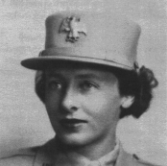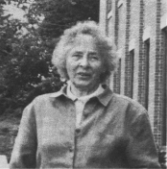




Barbara Gwynne is a mature and intelligent lady whose thoughtful, articulate speech lends her a dignified attitude. Always interested in volunteer work, she was an active leader in the Junior League, President of the Smith Hill Boys and Girls Club. She was born in 1913, and was 28 years old when Pearl Harbor was bombed. Her experience in the war as a WAC was a major factor in her life.
I had been in England in '37 and was much surprised to see all these factories going day and night, and so I asked someone over there what was going on, and they said, "We're getting prepared for war." I was stunned, of course, but I followed what was going on. In September '39, when England declared war on Hitler, I was prepared for it, but this country wasn't really prepared.
Once the war had started, I knew that since I lived on the east coast and was near Europe, we would have to go in and help. I think all of us were terrified of Hitler. I mean, he'd gone booming through all of Europe, just doing whatever he wanted to do, attacking and signing agreements that he never lived up to.
At this time, I was doing volunteer work in Providence for the Junior League. I was President in '41. While I was in the Junior League, there were lots of training camps around Rhode Island for the military, and there were lots of places for the enlisted men to go to meet people. People were very friendly to the soldiers. Yet there was no social place for the officers to go who were here in Newport and Quonset for training. During World War I, the Junior League had had an Officers' Club, so that when the men were off duty they could come into Providence and have some friendly people to talk to. So we went to the Biltmore, and they agreed to give us a room that we could use as an officers club. It ended up running throughout the whole war. All of these people from Quonset, Newport, Davisville, and all the rest of the military people around here came in to this O-Club. There were lots of Royal Air Force boys who were here flying Lockheeds. Also, there were Royal Navy and Royal New Zealand Navy boys who came up. The O-Club was a big success.
Pearl Harbor was a terrible shock, and it made you good and angry, I can tell you. Right after this happened, most all of the men in my life, including two of my three brothers, joined the service, I myself joined the WAAC's, Women's Army Auxiliary Corps, in January of 1943. Why? I didn't have the gall to stay out. I wasn't married, and practically every single person who I knew, who was able to walk, went in to try to help the country. I felt it was my job to help, too.
Barbara went through basic training and then Officer Candidate School. After a year, she was given the responsibility of directing an entire company. She recalls the excitement and heartbreak of this position.
I was made Commanding Officer of the WAC detachment at Stark General Hospital in Charleston, South Carolina. It was a receiving and evaluation hospital for our wounded coming in from Europe. The wounded soldiers would come in on hospital ships. We had wonderful doctors there who would size up and re-assess each patient and figure out all the problems with each patient. In about three or four days they would be shipped out by plane and train to the nearest hospital to their home that was equipped to take care of their particular problem. We were there during the Battle of the Bulge . We could sometimes get a thousand amputation cases off one ship. Most of the kids were 18, 19, 20 years old. There were bad amputations, minor amputations. As one can imagine, it's not easy to see all those thousands of kids so injured. Then we might get a whole ship load of neuro-psychiatric cases.
Stark General Hospital was really big, about 2,400 beds. I had about 250 girls working throughout the hospital. They did all kinds of jobs from secretarial to ward work to anything one can think of that anybody would do in a hospital. I saw to it that they were all housed properly, clothed, and were fed. I was completely in charge. I really liked this job a lot.
During my whole career in the army, I was paid $21 a week. The army provided just about everything else. First of all, they gave us our uniforms. We were very conscious of the fact that we always had to be in correct uniform, and that we were representing our government. Mostly, though, we wore skirts and shirts and neckties, jackets, and hats. We had winter and summer uniforms. We also had dresses for the summer and for evening wear. The army even issued us stockings. It was the early days of nylon stockings, and you've never seen nylon stockings like that. They lasted for years, and they never got runs. We even had khaki colored underwear and khaki colored slips. Next, the army fed us, of course, and any medical care that was needed was provided for.
During the war, I got to know some people pretty well. A great number of WACS had brothers in the service, or even a husband in the service. Since we were at war, many of their friends, relatives, or husbands were killed. When something happened to one of the girls or her family, the whole platoon would rally around and try to help her. War is no joke. When we went to the officers club, we'd get to know these boys in all these different squadrons. Then there would be somebody who would go down in the sea and that was it. He'd never be seen again, and it was very hard for the rest of the squadron to see this happening all the time.
This side of war people don't hear much about. I myself really have not heard a lot about the inglorious side of war. Usually the glamour of war is emphasized, the winning of battles with cheering and much celebration. Now, the war was hitting home, and even though people may call it "The Good War," it still adversely affected many people's lives, as Barbara recollected.
When the war ended in Europe, the army was going to ship all these soldiers towards Japan. Then the bombs were dropped, and the war ended like that. I'd be very surprised if anyone of my generation would think it wasn't very worthwhile to drop those bombs on Japan. One might think, since the war had ended, that there would be a lot of celebration. I don't remember celebrating at all because I was just hard at work at my usual job. What bothers me today is that some of the Vietnam veterans seem to think that when people came home from other wars, everyone was out there parading and waving flags and stuff. That wasn't true at all. It was only the people in this country who were already here who celebrated. We had literally millions of men and women all over the world when the war was over, and they didn't come home right away. The ones that were overseas in all these countries would just drift home one by one with no recognition at all. Then if they had jobs, maybe they could get their jobs back, and maybe they couldn't. There was no great celebrating, kissing on both cheeks, for the soldiers that came home from the wars. It wasn't that way at all.
When the war finally was won, I was in charge of closing down two different detachments. I closed down the company at Stark General Hospital. Then I was sent to Camp Blanding in Florida to close down another company. One can't imagine how big this camp was. It was so big there were 22 chapels scattered all over the post. As the WAC Detachment Commander, I was given a jeep for my personal use. I must say it was great fun to have a jeep. There were probably about 400 women and 40,000 men there.
Before the war, I wasn't employed, except temporarily, and after the war I wasn't employed either. I wasn't unique. Everybody works today, whether they're Mrs. Rockefeller or whoever they are, but it wasn't that way when I was young. Fathers were supposed to support their families in those days, poor guys.
Now that the war was over, my plans for the future were just survive. I got married, and my husband and I had a baby. We just did what was in front of us. I can tell you, though, women had become much more independent because we had the experience of standing on our own two feet while husbands of fathers were overseas. We had to do it, and so obviously we were used to making decisions for ourselves and were more independent. I suppose that it was a surprise for some of the men. Yet, my husband took care of me. He took such good care of me and spoiled me that it was hard for me at first to get accustomed to being spoiled like that, I must say. It's something one can thoroughly enjoy, once used to it, though.
War is terrible, and I hope that I never have to get any closer than I was when I was at that hospital, because you could see the results of war. You know, old men make the war, and then the young men have to fight it.
Copyright 1995